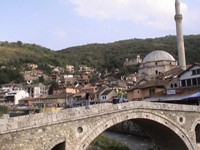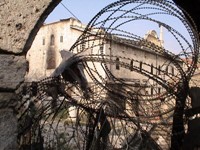Imagine this: America invades a Muslim country to drive out a repressive regime and the Muslims love us 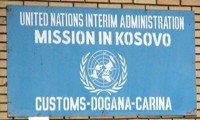
Welcome to Kosovo.
It’s what Iraq was supposed to be.
Border crossing
I bought my bus ticket to Prishtina, Kosovo’s capital. I knew it’s an ugly city, but I was more interested in meeting the people than seeing the sights.
At the heavily fortified border, I saw tons of United Nations vehicles and personnel. The border guard glanced at my American passport and gave it back to me. That’s a good sign, I thought. Maybe they like us.
Just English
I normally like to learn and speak the local language, but here I decided I would only speak English. Why? I read a book about Kosovo which told of one case when an ethnic Albanian asked a young Bulgarian UN worker in Serbian for the time. The Bulgarian politely replied in Serbian, thinking he was talking with a Serb. The Albanian thought he had found a real Serb, so he took out a gun and shot him dead.
So English only, I thought. No Albanian and no Serbian. “Just English” was my mantra.
I’m used to traveling throughout Eastern Europe feeling illiterate. I pass endless signs that say things in a language I don’t know. But for some odd reason I could read nearly all the signs in Kosovo. I could easily understand store signs, billboards, and menus. I guess it helped that they were all in English.
With all the relief workers and NATO soldiers running around, it makes sense that most signs are in English. After all, they’re the best customers with lots of Euros to spend.
Yes, although Kosovo is still officially part of Serbia (and is being administered by the UN), it doesn’t use the Serbian Dinar. They use the Euro, just like Montenegro, which is also part of Serbia. It’s rare to find a country that has two official currencies.
Can you imagine if you had to change your dollars when you went to the East Coast of the US? One country, two currencies. Balkan logic.
A police state
When I stepped out the bus I was nervous. I was in Kosovo. It’s been nasty and dangerous here for the last five years.
But 60 seconds wouldn’t pass before I saw a UN vehicle, a police SUV, a military vehicle, or uniformed security guard on the street. The tight security was most impressive. And the cost of it was most depressing. I’m helping foot the bill, so I guess I should be glad that I’m benefiting from it.
Bill Clinton blvd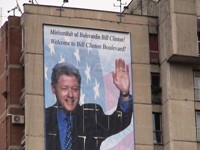
As I walked into the center of Prishtina I couldn’t believe what I saw: a massive picture of Bill Clinton smiling and waving at me.
It is 6 stories high. Next to the picture it read in huge letters, “Welcome to Bill Clinton Boulevard!”
I blinked a few times and took another look. The picture was still there. I checked my medications.
Another block I saw a new building called Hotel Victory. What was most distinctive of this hotel is that it had a small replica (7 meters / 25 feet tall) of the Statue of Liberty.
Is it possible that the Kosovars like us that much or is this “imperialistic” America imposing its icons on this Muslim region?
Crashing a Kosovo party
Albanian music was blaring just a few blocks from the Prishtina’s city center. About 100 people were having a party. A few were well dressed, but many where in jeans and nice shirts. The food smelled good. “Time to meet the locals,” I thought.
I boldly plunged in with my big backpack, T-shirt, and jeans. Although I got a few curious looks, I eventually started talking with the Kosovars.
The party was for RTK (Radio Television of Kosovo) employees. I told a couple that I was from America. They smiled and offered to go sit somewhere and talk.
“Who do you consider your allies in the region? Your best friends?” I asked.
The woman said, “America!”
“Because they helped us.”
“Why did we help you?” I pressed.
“Because I think America understands what it means to be human.”
“Would you say that most Albanians in Kosovo like America?” I asked.
“Yes! We love America and are very grateful.”
Now I started to get curious. “You’re Muslim, right?” She nodded. “Why do you think that Muslims here in Kosovo love Americans so much and see us as liberators, but that many Muslims in Iraq hate us?”
A gnarled expression swept across her face. “What? Muslims don’t hate America! Don’t equate Muslims with those terrorists! We’re not terrorists! Those terrorists in Iraq aren’t Muslims!”
I calmed her down, afraid that she might blow herself up.
She enthusiastically offered to introduce me to Fatmir Bajrami, a Cameraman Supervisor for the station. He is an Albanian who has been married to a French woman for 24 years in Kosovo. Albanians don’t like the French because they side with the Serbs frequently. But she’s survived.
I drank some orange Fanta and ate lots of hamburgers and sausages while I waited for Fatmir. Can’t find pork anywhere in Kosovo.
Balkan history, Kosovo version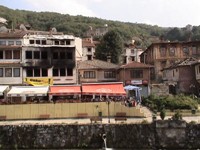
Fatmir had tan skin, gray hair, and dark intelligent eyes. He had filmed Nixon, Reagan, Bush, and Clinton. He had traveled the world. I hoped he would fill the gaps in my knowledge.
Although he spoke English well, his French was a bit stronger so we spoke in French.
“What does Kosovo want?” I asked, “Do you want to become part of Albania?”
“No,” he said firmly. “We want to be a completely independent country. We want all Kosovars, not just the ethnic Albanians who live here, to live in peace as an independent country.”
“Albanians who live in Montenegro, Serbia, and Macedonia have tensions in each of those countries. Why? Why do Albanians not like to integrate with the country they are in?”
“You have to understand the history,” he told me.
Oh great. Here we go again. At least he spared me from regurgitating the glorious Illyrian history.
He drew a map of the Balkans. He showed how Albanians overflow into Macedonia and Montenegro. Those border towns are primarily made up of Albanians. He said Kosovo has been over 85% Albanian for centuries, even under Serbian/Yugoslavian rule.
Serbs would dispute this. After 1913, when Kosovo became part of Serbia again (after a 500 year break), Serbs started moving into Kosovo. After WWII Serbs represented almost 50% of Kosovo.
But after WWII, Serbs started moving out and Albanians started moving in. Although I couldn't find a family with more than 4 kids, it's true that Albanians reproduce faster than anyone else in the Balkans. Combine that with a steady Serb exodus from the rural province for more prosperous urban areas of Serbia, and you get today's minority Serb population in Kosovo.
Fatmir explained, “Albanians live in all these regions because they used to be part of Albania prior to the First Balkan War of 1912. After that war, parts of Albania were divided among the victors.”
“So they don’t integrate because they feel like it’s their land that’s getting occupied?”
He nodded.
“What do you think of the Serbians?”
“Well, they’re descendents of slaves. They came out of Russia and are still trying to live on this land.”
Boy, I’m glad a Serb didn’t overhear that comment. He implied that Albanians are the natives and the Serbs are immigrants still disoriented in this land. Ouch.
Serbs have been here for over a thousand years. At what point are you a native and no longer an immigrant? And why should that matter anyway?
I saved my best question for last. “Do you think those regions in Montenegro and Macedonia, which have heavy Albanian representation, will become independent or part of Albania/Kosovo?”
He ominously said, “No… not yet. Maybe later.”
Shivers went down my spine.
Some anti-Albanians say that Albanians have a grand multigenerational plan to reestablish their “Greater Albania.” Talking with Fatmir I began to see that some Albanians do indeed have this dream.
Trail magic in Kosovo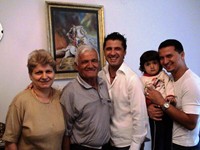
With my stomach full of meat and Fanta, I grabbed a bus to Prizren, the most picturesque town in Kosovo.
I told the bus driver before I bordered that I only had dollars and no Euros because all the banks were closed on Sunday. He patted me on the back and said, “No problem, my friend!”
“My friend?” No Eastern European bus driver has been that cheerful. He said it such a way that implied that I wouldn’t have to pay.
The bus was one of the nicest in Eastern Europe. Your tax dollars at work. It had a TV which displayed a scantily clad female dancing. No singing. Just gyrating. Are we in an Islamic country or not?
I asked the guy who sat in front of me if he spoke English. He did. I asked if I could sit next to him and talk. He enthusiastically agreed.
When the ticket collector came by I mentally prepared to explain in simple English why I didn’t have Euros. Then I heard Shpejtim, my neighbor, say “Dy,” which is the Albanian word for “two.”
“Wait, wait…” I said, “Here take $5, don’t pay for me.” He didn’t even know that I didn’t have Euros. He was paying for my $3 Euro ride (which isn’t cheap for Kosovo) regardless of what I said.
“Why did you do that?” I asked.
“Because I will never, ever forget what you Americans did for us. I am very grateful. You saved us,” he said with deep sincerity.
Shpejtim fled to Switzerland when the war broke out and is still working there. His generosity, friendliness, and good sense of humor were overwhelming. Good, that will allow me to ask tough questions.
“Why don’t you wear a white hat?” I asked.
He laughed. “Only old, traditional Albanians wear that hat. It means nothing. You don’t have to wear it. It’s like people from Texas wearing a cowboy hat. It’s not religious, it’s just fashion. But young people don’t wear it. It’s no big deal.”
“When you immigrate to America,” I explained, “You must learn English. Forget about creating Spanish only public schools, for example. English is our language and it’s what helps keep us together. Why do Albanians insist on having Albanian schools in Macedonia and Montenegro?”
“Why not?” he retorted. “When I am a minority in a country, like Switzerland, I learn the language. I speak German well. Nobody wants to have an Albanian school there. All Albanians who live there learn the local language, of course. But once we’re over 50% of a country, why shouldn’t we have schools, especially in areas where our representation tops 85%?”
Good point. Look at Switzerland, after all. One small country, three official languages. Living in peace. Well, sort of.
Shpejtim told me, “When I go to the French part of Switzerland, I know they also speak German, but they don’t want to speak German with anyone. So I have to speak to them in English, even though it’s not very good. Why? Why do they not want to speak German and instead talk in English? Why? I don’t understand.”
Maybe because German just sounds bad, I thought.
Shpejtim also spoke Serbian because Kosovo was under Serbian rule for so long, so he speaks four languages. His intelligent answers made me think deeply.
Kosovo has made me ask myself, “What is a nation?”
Why can’t Macedonia, Montenegro, or Serbia have regions that speak Albanian anyway? Who says a nation must have just one language and culture? Plenty of nations function with more than one language:
- Finland’s west coast speaks Swedish. All Finns must learn Swedish as a second language.
- Canada’s Quebec speaks French (and almost declared independence over it a few years ago).
- Spain’s Catalan region doesn’t use Spanish as its first language.
- India has a billion languages.
Albanians have a point. Who says everyone in Macedonia has to speak Macedonian? Why can’t Albanians and Macedonians co-exist side-by-side in peace? Why do Macedonians make such a big deal about it? It’s just a language.
Kosovo isn't unique
As hard as it was for me to understand the Balkans, Fatmir suggested that the problem isn’t unique:
- England has its trouble with Northern Ireland.
- Spain has the separatists Basques.
- Mexico has Chiapas revolutionaries.
- Russia has Chechen rebels.
- China has Tibet that wants independence.
- Africa is just one big mess.
Throughout the world ethnic minorities that may have different languages or customs than the majority fight for representation or liberty. This is especially true when the majority makes the minority feel like 2nd class citizens.
Staying with a Kosovo family
Shpejtim asked if I had a hotel reservation. I didn’t, because I wanted to camp in Kosovo.
“Stay with my family! I’ll take you to my house, and if it’s OK, then you stay. If you don’t like, then you can go. No problem!”
I can’t resist staying with a local when I get a chance.
My meat orgy was still in my stomach, when Shpejtim’s mom fed me more fresh tomatoes, goulash soup, and a succulent dumpling. It was all delicious and his family was delightful.
And then the power went out.
Within seconds they brought out candles and electric lanterns. “How often does this happen?” I asked.
“A couple of times a day,” they shrugged.
Indeed, the cities of Kosovo are extremely loud. This is mostly because all the stores have small Honda gas powered generators running on the sidewalk. Since they’re one after another, the whining decibel level is quite high.
I asked about a dozen people in Kosovo how many kids per family they had to see if they really did have huge families. The common answer was 2-3 kids for city folk and 3-4 kids those in the countryside. They might have 10-12 in a household, but it’s because they’re living with grandparents and other relatives, which is common in non-western countries.
I am deeply grateful of Shpejtim and his family. He confirmed that Albanians truly do have incredibly big hearts.
But also Shpejtim gave me hope for the Balkans. His ability to speak rationally and calmly about this difficult subject was refreshing. Moreover, he never condemned all Serbs or Macedonians. He always emphasized that a minority of each of those groups cause most of the problems. Likewise, he admitted that Albanians aren’t perfect either. If more in the Balkans can learn Shpejtim’s ability to forgive and his desire to move on, then there is hope.
Interrogating Germans in Kosovo
Prizren is a nice town with a river slicing through it and hill rising above the city. As in everywhere in Kosovo, people were building new structures everywhere. So I was surprised when I saw that a certain section in Prizen right next to the river on a hill was in shambles. The fire scars and collapsed roofs testified to the war.
But with all the construction going on, you’d think they would rebuild this nice neighborhood that has a perfect location. As I approached I saw a sign “WARNING: KFOR Zone. Use of weapons permitted.”
KFOR stands for Kosovo FORce. It’s the NATO peacekeeping force.
The sign implied that you may be shot on sight.
So I went for a stroll through the destroyed neighborhood.
It finally dawned on me why the Albanians hadn’t rebuilt this. This must have been a Serbian neighborhood. Duh!
I took pictures of the kitchens in shambles. The broken windows. The overgrown gardens. Dilapidated living rooms. It was sad to think that Serbs, most who were completely innocent, once lived in these houses along these narrow quaint streets. Their homes were destroyed simply because they were born in the wrong region.
I later learned that a few months ago (March 2004) angry Albanians sought revenge and went on a rampage through Serb neighborhoods. Albanians also destroyed nearly every Orthodox Church they could, brick by brick.
I saw an Orthodox Church high on the hill, partially destroyed, and protected by a KFOR troops.
I carefully stepped over shattered glass and fragments of metal and wood throughout the street. I wondered if some Serbs or Albanians planted mines here to discourage what I was doing.
Then suddenly a man in camouflage appeared with a massive automatic rifle in his arms.
I smiled, feeling quite vulnerable.
“Hallo,” he said. “Sprechenzi deutsch?” he asked.
“Enshuldigun, ich spreche kine deutsche,” I answered. Which I think means, “I surrender, mighty Nazi!”
The man had the German flag on his KFOR uniform. He was pretty scrawny and had shaded glasses. He was a geeky German with a really big gun. He didn’t speak English, but he pointed to my camera and shook his head.
Oh great! I could use my favorite German word, “Das ist VERBOTEN?”
“Jah,” he nodded.
I showed him the three pictures I took on of the KFOR area with my digital camera and asked, “Verboten?” He said “Jah” to everyone. I deleted all three. He seemed happy, but still didn’t smile.
He escorted me to the church on the hill. There was a bunker made out of sandbags and barbed wire all around the church. Germans were standing guard totting huge automatic machine guns.
I asked to talk to a soldier who could speak English. A man whose belly indicated he had drunken a few too many German beers came over.
Since I was talking to a German, I got straight to the point, “Who do you think should be blamed more for all the atrocities in Kosovo, the Serbs or the Albanians?”
He took a step back, looked at the horizon and said, “I think it’s the Albanians.”
He had only been there six months and would be there another six, so he missed out on all the stealing, raping, and killings that the Serbs did before. But I wanted him to elaborate.
“For example,” he continued, “The Albanians broke into a Serbian doctor’s house, made him watch as they murdered his wife and all three of his kids. Today this doctor is insane. He babbles and has completely lost his mind.”
“How long will we stay here?”
“20 years,” he said with his thick German accent. “I’m serious. I think they want us to stay. We build roads and houses for them. And it’s all free for them. Provide free security. But they’re crazy.”
“Why?” I wondered.
“We’ll build five houses for the Serbs and a gang of Albanians will come and burn them down. Then we’ll build five houses for the Albanians and a gang of Serbs will come and destroy those houses.” He sighed, “I don’t understand these people.”
“What about this Serb neighborhood, are the Serbs going to try to live here again?” I asked.
“Yes. I don’t understand them. Their neighbors burnt down their houses, but they say, it’s my house and I want to live there." He continued, "If I come to America and people say, ‘Fuck you German,’ I’ll leave and go somewhere else. But these Serbs insist on living here. I just don’t understand these people.” He shook his head.
“Is it worth it to walk to the top of this hill?” I asked him.
“Yeah, you will see an old fort and a good view. But if you come here at 10PM or so, you’ll see at least 50 young kids marching up the hill to…” he thrust his hips out.
“I see,” I understood, “Not very Muslim of them is it?”
He smiled. Before heading up the hill I asked, “Do you foresee more problems?”
“Yes, we’re waiting for the October 22 election in Kosovo. We expect violence.”
I felt bad for these poor Germans. They’re so orderly and civilized. And they must live in this mess. What goes through their head when they look at the chaos here?
Trapped in Kosovo
I tried to leave, but the bus never showed up. While I was waiting I talked with an ethnic Albanian who was born and raised in Macedonia. The Macedonian regions of Tetovo and Gostivar are 80% Albanian. The entire country is 35-45% Albanian, depending on who is counting. Most ethnic Albanians round up and say that half of Macedonia is Albanian.
“It’s terrible that the Macedonians don’t make any effort to learn Albanian,” he told me.
“Why should they?” I asked. “You’re all living in Macedonia after all, not Albania.”
“But we make up a large percentage of the region.”
“OK,” I told him, “Let’s say a bunch of Kenyans move to your country and become a pretty significant part of the population in a region. What would you say if they tell you, ‘Hey buddy, you should learn to speak some Kenyan!’”
“But that’s different,” he said, “This isn’t their native land. Albanians have lived in this region before it was Macedonia.”
“Do you know who owned California before the Yankees? Mexicans. But no Mexican who comes to California today would dare tell an American that he should learn to speak Spanish. The Mexican knows that he is in the United States and it’s his responsibility to learn English, not our responsibility to learn Spanish.”
He was speechless and then said he was going to look into where the bus might be. I don't think he liked me because I never saw him again.
Given all my tough questions throughout the Balkans it’s amazing that I haven’t offended more people or been ethnically cleansed.
Camping in Kosovo
Since I missed my bus, it was a perfect opportunity to join my fellow Americans and set up camp in Kosovo.
I was disappointed that the bus didn't come when it was supposed to, so I didn't want to contribute money to the overpriced hotels. Since there is a ton of construction throughout Kosovo, it was easy to find a place that was under construction. I walked up to the 3rd floor and became the first person to sleep in this apartment. Although I could have had nightmares about a lunatic Serb or Albanian finding me there and cleansing me, I slept like a baby.
My wish comes true
The Balkans is incredibly complicated. Trying to understand this place makes my little head hurt.
In an effort to understand the people who live here, I've tried to imagine the same thing happening in the United States. The closest analogy is the influx of Mexicans. I wanted to talk to a real Mexican living in the US and ask him if many Mexicans could identify with the Albanians.
My dream came true just as I was leaving Kosovo. On the bus to Macedonia I sat next to a stocky, tan skinned, 50ish man with slicked back black hair. He lives in south Texas and was born in Mexico. He has six children. His Spanish accent was obvious when he spoke. Although he spoke English well, we switched to Spanish. I had a fascinating conversation with him.
“Do you think the situation with Mexican Americans is similar to the one here in the Balkans?” I asked.
“No,” he replied.
“Why not?”
“There’s just too much hate here. The hate is so deep.”
“Do any of your Mexican friends wish that there were Spanish-only public schools in America?”
“No, we just want to come and work in America,” he told me.
“The Mexican population in the US is exploding. If they get critical mass, do you think that they would ever want to separate from the US, like the Albanians in Macedonia, Serbia, and Montenegro?”
“No, Mexicans have no interest in that.” He continued, “I don’t understand these Kosovars. They don’t learn from others and have no interest in assimilating. I'm looking forward to going home."
It's nice to be loved again
Throughout Eastern Europe, I've gotten some pretty lukewarm responses when I tell them that I'm from the USA. One mother at a Zagreb train station said, "San Francisco? Oh. America. I hate Americans. And I hate your President."
Yeah, it was a pleasant conversation.
But in Kosovo everyone gave me wide smiles and their eyes twinkled with delight. I realize that it's only because we defended them, but I don't care. It feels good that at least one part of the world that loves Americans.
Kosovo's future
Throughout the Balkans I asked people how things were going. Most people in Montenegro, for example, said that things were getting worse and they had little hope. Kosovars, on the other hand, were consistently optimistic about the future. The sad irony is that they’re both wrong.
Montenegro and Kosovo are both small areas, but Montenegro has a rich coastline that it can exploit like Croatia. Kosovo has almost nothing. No manufacturing, no major food export, no financial center, no capital markets, nothing.
I looked out of my bus window and wondered:
- Who will invest in Kosovo? The risk is so high and the reward is so low.
- Who will trade with Kosovo? Its neighbors who hate them?
- What will happen when NATO pulls out and stops giving them free money? Their fragile economy will collapse.
Eventually they will realize that they need to join forces with Albania to complete the dream of a Greater Albania. Although that change could happen peacefully, few major changes in the Balkans ever do.
Who's right?
After visiting Kosovo, the Balkan puzzle was complete.
Although I kind of understand this complex region, the solutions are still not obvious.
Like the Jews and Arabs, the folks who live in the Balkans dwell on the past and refuse to forgive and move on. Similarly, both sides are so inflexible and unwilling to compromise.
Ethnic Albanians need to learn to integrate in whatever nation they live in. Meanwhile, those governments need to make the Albanians feel like equal citizens.
However, it's unlikely that this will happen. Those who dream of a Greater Albania will forge ahead until their dream is complete. As long as Albanians feel oppressed, those revolutionaries will continue to have followers.
My cell phone gets stolen
Someone stole my cell phone. It might have fallen off my hip belt on the bus from Kosovo to Macedonia. Someone might have swiped it then. Or a thief might have pilfered it off my hip as I was getting off the bus.
The biggest pain is re-entering all those cell phone numbers.
My watch and camcorder broke. My cell phone gone. Random clothes abandoned. My heart stayed in Kotor, Montenegro. I think I will leave my brain in Bulgaria.
